Introduction
Entrepreneurship is important for local and global economies, but a set of complex, interconnected issues often make the process of establishing and maintaining a business rather difficult (Burton, 2015; Khan, 2013). These issues can be related to various aspects, including legislation or the specifics of the life of a community; also, some of the problems can be resolved, for instance, through a review of policies (Al Doghan, 2015; Lougui & Nyström, 2014). Consequently, modern governments attempt to improve their policies to support beginner entrepreneurs (The World Bank, 2017). It appears logical that this process needs to be aligned with the views and experiences of the entrepreneurs themselves, which is why the present study was carried out.
The present paper considers research that focuses on the perceptions of obstacles as reported by male beginner entrepreneurs who have established a transport business in the Eastern Province of Saudi Arabia. The study pays specific attention to the experiences of expatriate and native Saudi entrepreneurs and attempts to compare them. The topic of comparing the two groups is of significance because the literature review shows that it is relatively under-researched. The study is qualitative and based on open-ended questions, which were distributed to forty participants (twenty Saudi and twenty expatriate entrepreneurs) in the form of questionnaires.
The paper includes a discussion of relevant literature, the methodology of the study, and the analysis of the outcomes. It concludes that, in general, the findings of the study coincide with those of the literature review and suggests an assessment of the obstacles that the respondents report, which include legislation, competition, the shortage of resources, cultural and societal differences, and discrimination. The literature review does not reveal an extensive amount of research on the specific topic that is examined by the study, which highlights the importance of ongoing investigation in this area. Thus, the present study offers its contribution to the understanding of the specifics of the transport business obstacles in the Eastern Province of Saudi Arabia. The findings can be employed theoretically or practically by business researchers and policymakers of the region.
Literature Review
Entrepreneurship, which can be defined as the occupation that is related to starting and maintaining a business, has always experienced obstacles in various settings, including those of Saudi Arabia (Burton, 2015). The obstacles can be defined by an intersection of features, including age, gender, and country of origin of an entrepreneur (Efendic & Yetis, 2013; Welsh, Memili, Kaciak, & Al Sadoon, 2014), the location of their business (Khan, 2013), and current events or political and economic climate (Khorsheed, 2015). The present paper intends to discuss the issues that male beginner entrepreneurs can encounter in the Eastern Province of Saudi Arabia with a focus on their country of origin (native or expatriate). Thus, the present literature review includes the discussion of generic obstacles as well as those related to Saudi Arabia. An attempt at defining the barriers specific for native and expatriate entrepreneurs is also made.
Entrepreneurship Obstacles: A General Overview
Entrepreneurship is beneficial for the economy of a particular country and global economic growth in general (Ahmed, Zgheib, Carraher, & Kowatly, 2013; Alaoui, Shopovski, Kvirkvaia, Alam, & Ofili, 2016). However, beginner entrepreneurs typically find themselves under significant strain, which is the result of a system of issues, including internal (personal and organization-related) and external ones (Burton, 2015; Lougui & Nyström, 2014). The latter can be classified as obstacles. Extensive research of entrepreneurship-related obstacles has been carried out by researchers all over the world, which allows making certain conclusions on the external issues that are typically experienced by entrepreneurs regardless of their context or specific features. These challenges include legal, cultural, socioeconomic problems (Alaoui et al., 2016).
The legal obstacles can involve multiple national and local regulations and policies, including those related to taxation, administration (for example, business registration), funding, private property management, and domestic and international trade (Al Doghan, 2015; Lougui & Nyström, 2014). It is noteworthy that the introduction of legal obstacles is typically the outcome of the efforts aimed at ensuring the protection of stakeholders or the interests of the country, which makes the existence of these particular issues inevitable and necessary (Alaoui et al., 2016). Also, appropriate policies can act as an advantage and promote entrepreneurship (Ahmed et al., 2013).
Still, legal obstacles are most often reported by entrepreneurs and seem to be a major concern for them (Lougui & Nyström, 2014). Moreover, Lougui and Nyström (2014) point out that the lack of legal transparency and appropriate consultation services can worsen this issue and its impact on entrepreneurship. The problem of legal obstacles seems to be particularly relevant for the present study.
The socioeconomic obstacles of entrepreneurship include multiple features from political factors to economic ones. For example, political instability and corruption have been shown to hinder the development of entrepreneurship, and the same can be said about the generally low life standard in a country or another location (Ahmed et al., 2013). Morevoer, Alaoui, et al. (2016) and Lougui and Nyström (2014) also mention the fact that the availability of human resources (specially trained ones) is important for business, and if the society lacks this resource, this factor can be regarded as an obstacle.
As for the cultural features, they include mentality as well as religion. For example, the specifics of cultural norms with respect to risk tolerance or the social status of various occupations can serve either as advantages or obstacles to the entrepreneurship of a particular country (Khan, 2013). To sum up, the issues that modern entrepreneurs can encounter are multiple and refer to almost every aspect of human activity.
Saudi Arabia Obstacles
The modern research on Saudi Arabia entrepreneurship allows determining certain issues that are likely to become obstacles for modern Saudi Arabia entrepreneurs (Burton, 2015). First of all, as it is mentioned above, the legal environment can be regarded as a major obstacle (Burton, 2015, p. 144). For example, Burton (2015) discusses the issues which affect land and property ownership and result in difficulties from the point of view of the acquisition and maintenance of physical facilities for entrepreneurs (p. 150). The World Bank (2017) reports that Saudi Arabia’s government has been making entrepreneurship easier by facilitating the processes of establishing a business, enforcing contracts, and paying taxes (pp. 23, 25, 30, 32).
However, the country still scores only 77 points in the ease of starting a business (out of 100), which is two points below the regional average (p. 16). It is the result of the presence of 12 different procedures, which typically require fifteen days to complete. These parameters can be compared, for example, to Oman, which has the first rank among the Arab countries from the point of view of the ease of starting a business. The World Bank (2017) reports that Oman has only four procedures required to start a business that takes up six days.
It can also be pointed out that from the perspective of other aspects, Saudi Arabia can score higher; for example, it scores 80 points from the point of view of the ease of construction permits use, which is almost 20 points greater than the average score in the region and earns the country the 15th rank among the countries worldwide (The World Bank, 2017, p. 37). Also, Saudi Arabia is one of the best countries in the Arab world from the point of view of getting credit (The World Bank, 2017, p. 107). These facts prove the idea that the government can indeed facilitate the process of doing business. In general, the World Bank (2017) concludes that there is notable progress in Saudi legislation, but there is still room for improvement. Legal issues are characteristic of multiple environments, but since the present study focuses on Saudi Arabia, the specific legal obstacles that Saudi entrepreneurs experience seem to be of importance.
Certain socioeconomic and cultural features can serve as obstacles in Saudi Arabia as well. Usually, the gender equality issues are discussed from this perspective (Burton, 2015; Welsh et al., 2014), but from the point of view of male entrepreneurs, some socioeconomic features of Saudi Arabia can also be of importance. For example, the fact that Saudi Arabia is dependent on oil trade despite its diversification efforts has proven to be rather detrimental to the country’s economy, which has affected its businesses (Khorsheed, 2015). Similarly, economic downturns (both global and local) can be a significant issue from the point of view of entrepreneurship. For example, the recent events in the oil market have affected Saudi Arabia; the effects were worsened by the lack of diversification (Wilkin, 2016). To sum up, the economic features of the country and economic and political events can result in obstacles for native and expatriate Saudi entrepreneurs.
It is also noteworthy that education can become an issue, challenge, and obstacle for native Saudi Arabia entrepreneurs. Indeed, it has been reported that the educational system of Saudi Arabia is sometimes evaluated by its students as rather rigid and restrictive, which limits the ability of educational institutions to prepare students for the dilemmas of entrepreneurship that require quick and imaginative thinking (Burton, 2015, pp. 144-145).
Similar issues might be experienced by expatriates depending on the specifics of the educational system of their native countries. On the other hand, certain countries, for example, the US, specifically promote critical and imaginative thinking and problem-solving in their educational institutions (Burton, 2015, p. 144). The expatriates that come from these countries do not experience this obstacle, and the educational system of their countries of origin can be viewed as an advantage in the context of Saudi Arabia. Thus, educational barriers can be country-specific, which determines the difference in opportunities for native Saudi entrepreneurs and expatriates.
A similar pattern can be found when the cultural dimensions of Saudi Arabia are taken into account. Cultural dimensions are a tool that was first suggested by Geert Hofstede to compare and contrast cultures with the aim of improving cross-cultural communication (The Hofstede Centre, n.d.). This tool involves assessing certain dimensions of cultures, and some of these dimensions can be of relevance for entrepreneurship. One of these dimensions is risk tolerance or uncertainty avoidance (Khan, 2013, p. 31). Indeed, risks are typical for entrepreneurship, especially for beginner entrepreneurs (Burton, 2015). However, the Hofstede Centre (n.d.) states that Saudi Arabia is reported to have a high uncertainty avoidance (80), which presupposes a low-risk tolerance. While beneficial in some cases, it would be expected that this parameter is likely to restrict Saudi entrepreneurs from taking risks, which expatriates from other countries with a lower score in uncertainty avoidance might successfully take (see fig. 1).
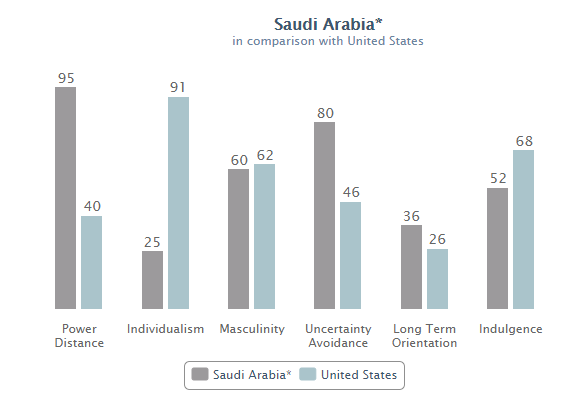
Other cultural dimensions that might be of importance for entrepreneurship including long-term orientation: a low score in this parameter implies a normative, traditional society, which might be reluctant to accept innovations that endanger traditions (The Hofstede Centre, n.d., para 1). Also, the remaining parameters are significant for interpersonal communication, which implies that they are of importance for public relations, human resource management, and marketing. It can be suggested that the Saudi entrepreneurs are more likely to be aware of the specifics of interpersonal communication in Saudi Arabia, which can be viewed as an advantage when compared to the expatriates from culturally different countries. To sum up, cultural specifics, which may be assessed through Hofstede’s tool to an extent, can serve as advantages or obstacles to native and expatriate Saudi entrepreneurs.
The experiences of Saudi Arabia male expatriates do not appear to be extensively researched or represented in recent literature. Therefore, there are limitations to the conclusions that can be made on the obstacles that they can encounter. However, the mentioned findings that are related to education and cultural specifics suggest that various countries of origin can have an impact on expatriate’s experiences as Saudi entrepreneurs, and some specific obstacles can be encountered by them in these settings.
Finally, it has been reported that despite the huge potential and noticeable developments in the area, the entrepreneurship ecosystem of Saudi Arabia is still in its infancy stage (Khan, 2013). An entrepreneurship ecosystem presupposes the presence of mechanisms within various areas (for example, politics, legislation, human capital, culture, and so on) which can promote and maintain entrepreneurship (Khan, 2013, p. 31).
The mechanisms can include convenient legislation, easy loan policies in banking institutions, the high socio-cultural status of entrepreneurship, the existence of support and consultation services, and so on. Thus, the underdevelopment of the entrepreneurship ecosystem can be regarded as a linkage of legal, cultural, and socioeconomic issues, which serve as obstacles to modern Saudi entrepreneurs. To sum up, the barriers that are experienced by modern Saudi entrepreneurs are rather numerous, but it is difficult to pinpoint the differences between the issues specific for native and expatriate Saudi businesspeople due to the lack of research on the latter.
Conclusion
The present literature review allows making a number of conclusions on the obstacles that are expected to be experienced by Saudi entrepreneurs, including expatriates and native ones. In general, it appears that all the issues which are typically encountered by entrepreneurs regardless of the country of their origin and work are relevant for Saudi Arabia. In particular, these problems include legal, socioeconomic, and cultural ones (Burton, 2015; Khan, 2013). The legal issues appear to be particularly relevant (Al Doghan, 2015; Lougui & Nyström, 2014). Apart from that, there exists the concept of the ecosystem of entrepreneurship, which incorporates the presence (or absence) of supporting mechanisms. Khan (2013) reports that in Saudi Arabia, these mechanisms are not very well-developed. Thus, the mentioned issues are relevant to native and expatriate entrepreneurs in Saudi Arabia.
Apart from that, there are obstacles that can depend on the country of origin of an entrepreneur, including the aspect of education. Indeed, Saudi education is reported to lack some of the features that make the education systems of some other countries (in particular, the US) more effective in the development of entrepreneurship-relevant abilities and traits (Burton, 2015, p. 144). Therefore, Saudi entrepreneurs and expatriates from countries with similar educational systems may experience the obstacle of their education. However, some expatriates, including the American ones, can find themselves in advantage from this point of view.
The information on the Eastern Province of Saudi Arabia is rather lacking, and it seems especially difficult to locate studies on the entrepreneurship obstacles in the area. Similarly, the amount of research on the differences between the experiences of expatriate and Saudi entrepreneurs in Saudi Arabia does not seem to be very large. Thus, the present study is likely to contribute information on an under-researched topic, which should be of particular relevance for entrepreneurs and, possibly, policy-makers of the Eastern Province of Saudi Arabia (Lougui & Nyström, 2014).
Methodology
The present study is qualitative, and the choice of this approach is guided by the aims of the study. Indeed, the research reviews the perceptions, views, and experiences of the respondents, which can be examined to a greater extent with the help of the insights that are typically produced by qualitative methods (Bryman & Bell, 2015, p. 392). The specific data collection method is that of a questionnaire, which is chosen due to its convenience in distribution and analysis (Creswell, 2014). To improve the ability of the questionnaire to produce deep, insightful responses, open-ended questions were predominantly used (Bryman & Bell, 2015, pp. 12-13). Thus, the methodology of the study corresponds to its aims and helps it to fit into the limited timeframe.
Data Collection: The Sample
The present study involved distributing a qualitative questionnaire with predominantly open-ended questions to beginner entrepreneurs who have started their business in the Eastern Province of Saudi Arabia. The specific business sector that was targeted by the questionnaire was that of the transportation service. Only male entrepreneurs were asked to respond to the questions because of the differences in the position of male and female entrepreneurs in Saudi Arabia, which suggests that the obstacles can be different for them (Welsh et al., 2014).
Since the present study aims at investigating the differences between native and expatriate entrepreneurs, the gender differences could introduce an additional dimension of discrepancies that would be of little relevance to the research question. Also, only the businesses that have existed for two years or less were taken into account to ensure that the entrepreneurs could be regarded as beginners. The final sample was adjusted to include twenty natives (Saudi) and twenty expatriate entrepreneurs (see fig. 2). Thus, quota sampling with the quota of twenty people for either group was used to define the final sample (Bryman & Bell, 2015, p. 202).

Ethical Considerations
The ethical considerations of the research were minimal; in particular, it was expected that some of the questions might have appeared as inappropriate to some of the participants. Also, it was expected that some of the participants might have chosen to stop participation. The introduction to the questionnaire explicitly states the aim of the study and the fact that the participants can skip any question or stop their participation at any time without any penalty. No attempts at identifying the respondents have been made, and the questionnaires themselves are going to be destroyed after the analysis is complete. All these measures should provide sufficient protection of the respondents (Bryman & Bell, 2015, p. 129). No compensation was offered for their participation, and it is important to thank them for their help in producing this study.
Limitations
The limitations of the study include the fact that it reviews perceived obstacles rather than factual ones. Since perceptions of the respondents are likely to be subjective, the findings of the study might not refer to the issues that objectively hinder the development of entrepreneurship in the Eastern Province of Saudi Arabia. However, the perceptions of the respondents are also very important because they have the firsthand experience of trying to start and maintain a new business in the area. The development of solutions for the facilitation of entrepreneurship within the Eastern Province of Saudi Arabia must take these experiences into account.
Another limitation of the study is its sample, which consists of 40 people. This sample can be regarded as relatively small, which does not allow making conclusions about larger populations. Also, the sample includes only the people from a particular industry in particular settings, which makes it difficult to extrapolate the results to other business spheres. However, the specifics of the study (in particular, the qualitative methodology), as well as its aims, justify some of these limitations. Indeed, the amount of information, which is produced by a qualitative study is rather large, which, given the time constraints, limits the opportunity for the coverage of a greater sample.
Apart from that, the study specifically aims to review the transportation entrepreneurship within the Eastern Province of Saudi Arabia, which explains both the relatively small sample and the limitations of the business and geographical area that are mentioned above. To sum up, the limitations of the study reduce its generalizability (Bryman & Bell, 2015, pp. 175-176), and even though they are mostly justified by the specifics of research, they still need to be taken into account when considering the findings.
Data Analysis
The questionnaire includes two sets of questions that are aimed at sampling the respondents, another set that investigates their experiences, and a final one that asks them to offer recommendations to the entrepreneurs and the government. The specifics of the first two sets are described above in the section devoted to the sample of the study. The rest of the results of the questionnaires can be summarized in the following way.
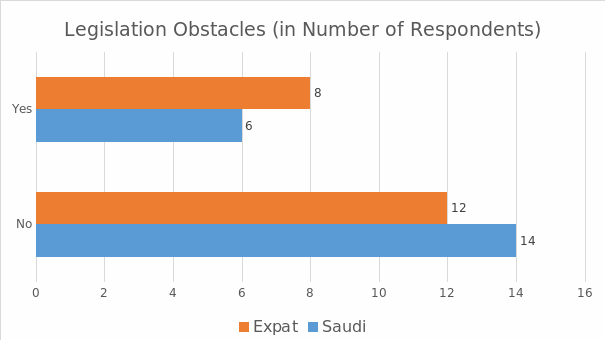
As can be seen in Figure 3, the majority of Saudi and expatriate entrepreneurs do not experience the issue of legislation-related obstacles, which includes policies and proper legislation. However, 30% of Saudi and 40% of expatriate respondents reported experiencing the problem. The respondents indicated that the issues were particularly visible during the registration of the business, and two of the expatriates also mentioned tax-related legislation difficulties. In general, the problem is clearly present, which corresponds to the findings of the literature review.
Indeed, according to the World Bank (n.d.), Saudi Arabia has been improving the legislation from the points of view of the ease of doing business, but some issues are still notable (in particular, with respect to starting a business). Thus, it appears plausible that both native and expatriate entrepreneurs could regard the present state of legislation as an obstacle. It is especially true for the entrepreneurs who come from countries where the procedures are simplified to a greater extent. Also, the differences in assessing the legislation as problematic or not could refer to the fact that the obstacles in the law are typically the result of the attempts to protect various stakeholders (Alaoui et al., 2016). To sum up, the findings of the survey appear to confirm those of the literature review.
None of the respondents states that they have experienced community-related issues. Also, as can be seen in Figure 4, the vast majority of the respondents have never experienced the problem of cultural obstacles. Only two expatriates (10%) reported the issue: one coming from the US, and one from India. It is noteworthy that both were mostly referring to cultural differences from the point of view of leadership and human resource management. The US entrepreneur also dwelled on the problem: he stated that he found it difficult to manage natives as well as Arab expatriates, which prompted him to hire a Saudi manager to work the human resources. This finding appears to be in line with the results of the literature review: as can be seen in the description of Saudi Arabia and the US by the Hofstede Center (n.d.), the two countries seem to be very different in three of the six cultural dimensions: power distance (55 points of difference), individualism (almost 70 points of difference), and uncertainty avoidance (about 35 points of difference) (see fig. 1). It appears plausible that such differences could cause issues in communication.
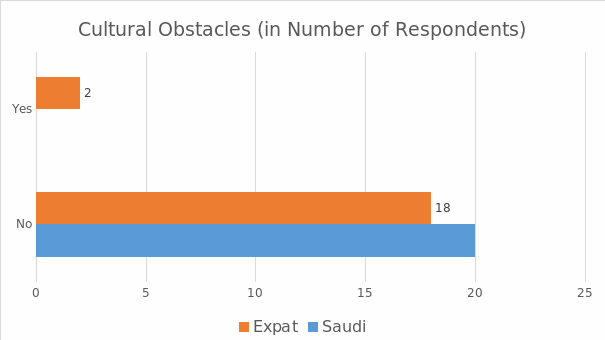
Thus, cultural barriers seem to be more noticeable to some expatriates, notably those that are not related to the Arab world. These findings can be supported by the fact that cultural specifics are reflected in the business specifics of a country, including business communication (Berger, Silbiger, Herstein, & Barnes, 2015). Therefore, the cultures that cannot be related to the Arab world (for example, that of the US) are indeed not unlikely to be drastically different from that of Saudi Arabia.
As can be seen in Figure 5, the majority of the respondents also do not report discrimination issues. Zero percent of Saudi mention this obstacle. However, three of the expatriate respondents (15%) still report experiencing discrimination. Thus, the problem is not non-existent. Here, it should be pointed out that the study can only describe the experiences of the respondents and cannot extrapolate the results to the population in general. In other words, while the findings do report the fact that the issue can be present in the expatriate population, no conclusions about its prevalence can be made with the help of only twenty people as the sample.
Similarly, the study cannot insist that discrimination is not experienced by Saudi entrepreneurs. Thus, the limitations of the research must be taken into account when reviewing these findings. Also, this factor demonstrates that at least some community-related obstacles are encountered by the entrepreneurs, even though they apparently did not relate discrimination to this group of issues.
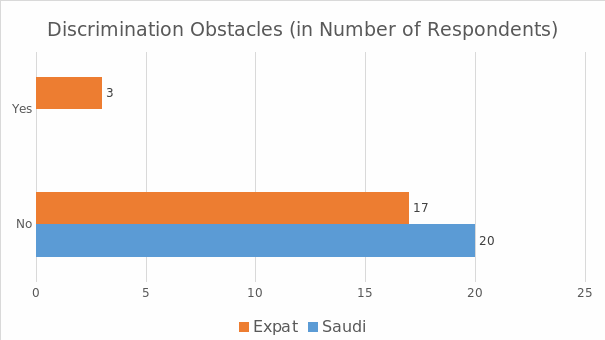
When asked to consider other barriers, 15% of Saudi respondents and 5% of expatriates report encountering no other obstacles. However, 85% of Saudis and 90% of expatriates state that obtaining resources is an issue; also, 65% of Saudis and 70% of expatriates point out the concern of finding a specific resource: funding. Moreover, 10% of Saudis and 20% of expatriates state that there are some issues with the workforce. In particular, three of them report that private organizations seem to be less favored by Saudi workers than public ones. Finally, 70% of expatriates and Saudis believe that competition is a major obstacle. To sum up, the question that required mentioning other obstacles demonstrates that there are significant restrictions that hinder the advancement of both Saudi and expatriate entrepreneurs in the Eastern Province of Saudi Arabia.
These findings are mostly supported by the literature review as well. Indeed, the issue of resources, including human resources, was mentioned by multiple authors (Alaoui et al., 2016; Lougui & Nyström, 2014); also, the problem of education can be related to that of the availability of well-educated employees (Burton, 2015). The fact that the respondents pointed out some of the specific aspects of resource shortage may indicate that this issue is particularly important in their view. Apart from that, it has been mentioned in the literature review that economic factors can become obstacles (Khan, 2013), which can refer, among other things, to the competition.
Also, the respondents were asked to rate the mentioned obstacles. Unfortunately, only eight of the people added the restrictions that they considered to be “other obstacles” into the table. Apart from that, two of the people who denied experiencing barriers also rated them, but these responses were not included in the report because the question was aimed at determining the perspective of the people who have experienced the issues. Thus, the final table, which can be seen in Table 1, does not contain the responses of all the respondents.
Still, the results can be used to illustrate the different perceptions of the difficulty level of the obstacles. In particular, it can be concluded that the legislation issue is predominantly perceived as an impediment with a medium difficulty, which is also true for cultural specifics and discrimination. However, the resources issue seems to be rather problematic, especially when funding is concerned. This finding confirms the prediction that the determination of the shortage of particular resources makes it reasonable to consider them as separate and very significant obstacles rather than group them under one label.
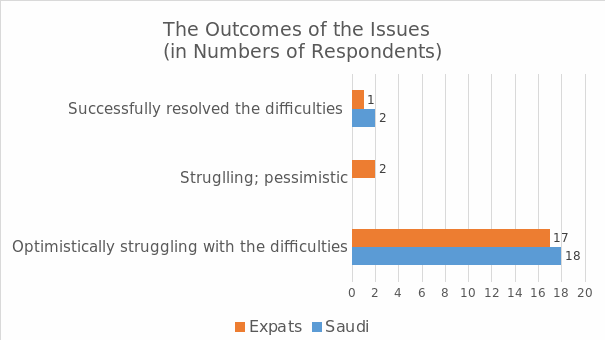
The questionnaire also attempts to define the outcomes of experiencing the obstacles (see fig. 6). 90% of Saudi and 85% of expatriate respondents are still struggling to resolve the mentioned issues, but they are optimistic about it and believe that they can manage the process. However, 10% of the expatriates are rather pessimistic about the problems and are not sure that they can resolve them. Also, 10% of Saudi and 5% of expatriate respondents believe that the mentioned issues are not very challenging. It is noteworthy that none of the respondents believes that their business is destroyed by the issues. In general, it appears that the majority of the respondents are optimistic about their ability to respond to the obstacles.
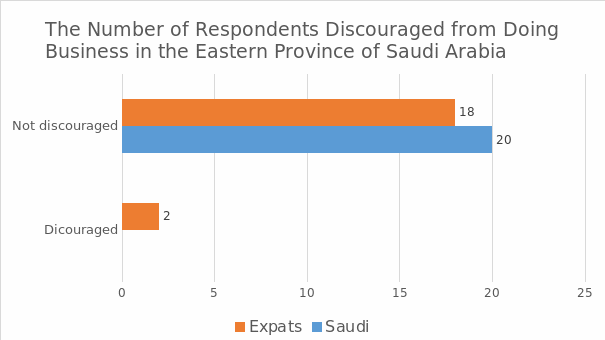
In the end, 100% of Saudi and 90% of expatriates do not want to give up their businesses because of the mentioned issues. 65% of Saudis and 75% of expatriates are not discouraged by the challenges, even though they acknowledge these obstacles as quite problematic. 30% of Saudis and 10% of expatriates do not view the mentioned issues as problematic enough to discourage them. Also, 5% of Saudi and expatriate people want to go on struggling with the issues because they like a challenge. However, 5% of expatriates are discouraged by the obstacles to the point of intending to stop their entrepreneurship, and 5% of expatriates are discouraged by the issues to the point of believing that their business is not needed in the Eastern Province of Saudi Arabia. These expatriates are discouraged by the obstacles from proceeding to do business in the area as can be seen in Figure 7. These findings highlight the importance of the actions of the government in facilitating the business-related activities as well as the activities of entrepreneurs in training for their occupation.
When offering advice on establishing a business in the Eastern Province of Saudi Arabia, 100% of respondents suggest adjusting to the context in a variety of ways (see fig. 8). In particular, all the respondents mention the legislative context, 40% of Saudis and 70% of the expatriates suggest studying the cultural context, and 60% and 80% of Saudis and expatriates respectively suggest investigating the customer. These suggestions appear to be in line with the mentioned obstacles.

Apart from that, 100% of all the respondents believe that the government can facilitate the process of starting and maintaining a new business in the Eastern Province of Saudi Arabia (see fig. 9), which corresponds to the findings of the literature review (The World Bank, 2017). In particular, 100% of the respondents believe that this goal can be achieved through improved legislation. Also, 20% of Saudi and 35% of expatriates suggest that financing activities (grants, sponsorship programs, simplified loans) could be promoted or developed by the government. Finally, 60% of Saudis and 55% of expatriates believe that there is red tape to be eliminated in the province, and they express a hope that the government will be able to resolve the problem.
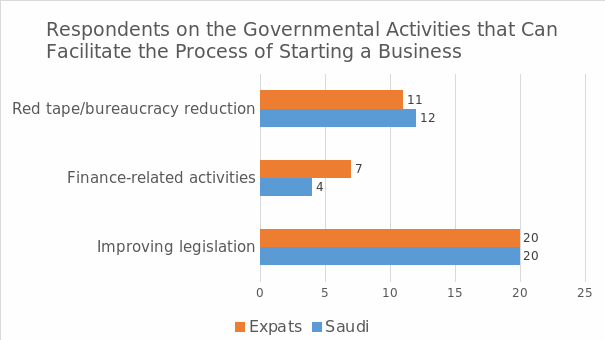
Data Analysis: Conclusions
The findings of the present study seem to contain certain patterns that appear to coincide with and expand the findings of the literature review. In particular, the results can be used to testify to the fact that the transport-business male entrepreneurs of the Eastern Province of Saudi Arabia are affected by the issues that are related to legal, socioeconomic, and cultural areas, which corresponds to the literature review findings (Alaoui et al., 2016). The obstacles to business registration and taxation were mentioned for the first area, those concerning competition, resources, and discrimination were highlighted for the second area, and those pertaining to intercultural communication were emphasized for the third area. The issue of resources appears to be particularly important: it was chosen by the majority of the respondents as a highly problematic issue, and some of the respondents chose to specifically point out its certain components, including funding and human resources.
The outcomes of experiencing the obstacles appear to be predominantly optimistic, but 10% of the respondents report that they are discouraged from proceeding to do business in the area. These respondents are expatriates, which brings forward the tendency of expatriate respondents to report more issues as compared to Saudi entrepreneurs with the exception of the red tape problem (see fig. 9). In fact, Saudi entrepreneurs do not seem to report cultural issues (see fig. 4). However, given the small sample, it is difficult to extrapolate this result. Finally, the respondents demonstrate that even the people who reported experiencing no difficulties could benefit from governmental efforts in legislation improvement. As for other suggestions, the respondents would enjoy reduced red tape and more financial help from the government. Also, they suggest that beginner entrepreneurs prepare for their occupation by studying the context of the country they have chosen for their business.
Conclusions
The present report has reviewed the outcomes of a qualitative study, which investigated the obstacles to entrepreneurship as viewed by Saudi and expatriate male entrepreneurs who have started a transportation business in the Eastern Province of Saudi Arabia. The findings coincide with those of the literature review in demonstrating that the obstacles are typically related to the legal, socioeconomic, and cultural areas (Alaoui et al., 2016). However, the study also indicates that the respondents consider the issues related to resource shortage as particularly important. Moreover, the study specifically requested the entrepreneurs’ advice. The respondents suggest that beginner business people need to be very well-acquainted with the context of the country that they work in, and they state that the government can greatly facilitate the process of starting a business in the Eastern Province of Saudi Arabia. In particular, they suggest changes in legislation, the reduction of red tape, and an increase in financial support.
The literature review demonstrates that the topic of the comparison of the experiences of Saudi and expatriate entrepreneurs in Saudi Arabia is not very well-researched, and the present study indicates that the expatriate entrepreneurs tend to experience more difficulties in general. Also, the cultural obstacles were only found to be relevant for expatriates. However, the sample of the study is rather small to extrapolate the results to greater populations, which implies that additional research is required on the topic.
The study also demonstrates that the obstacles can be problematic enough to discourage entrepreneurs from working in the Eastern Province of Saudi Arabia, which highlights the importance of the investigation of these issues. Indeed, the study shows that the government is capable of resolving some of the issues, and it also demonstrates that the investigation of the particular problems of certain entrepreneur population can help to highlight the obstacles specific to it. Therefore, additional research in the area is strongly recommended to inform the activities of policymakers and entrepreneurs themselves.
References
Ahmed, Z., Zgheib, P., Carraher, S., & Kowatly, A. (2013). Public policy and expatriate entrepreneurs. Journal of Entrepreneurship and Public Policy, 2(1), 42-53. Web.
Al Doghan, M. (2015). Satisfaction of Saudi nationals and expats towards loans by banks in Eastern Province, Saudi Arabia. Business Management and Strategy, 6(2), 1-14. Web.
Alaoui, A., Shopovski, J., Kvirkvaia, M., Alam, N., & Ofili, O. (2016). Obstacles to entrepreneurship in Albania, Georgia, Morocco, Nigeria, and Pakistan. European Scientific Journal, 12(34), 394-415.
Berger, R., Silbiger, A., Herstein, R., & Barnes, B. R. (2015). Analyzing business-to-business relationships in an Arab context. Journal of World Business, 50(3), 454-464.
Bryman, A., & Bell, E. (2015). Business Research Methods. Oxford, UK: Oxford University Press.
Burton, E. (2015). Business and entrepreneurship in Saudi Arabia. New York, NY: Wiley.
Creswell, J. W. (2014). Educational research. Planning, conducting, and evaluating quantitative and qualitative research. New Jersey, NJ: Pearson International Edition.
Efendic, N., & Yetis, Z. (2013). Exploring expatriate entrepreneurship (summary). Frontiers of Entrepreneurship Research, 33(15), 3.
Khan, M. (2013). Mapping entrepreneurship ecosystem of Saudi Arabia. World Journal of Entrepreneurship, Management and Sustainable Development, 9(1), 28-54. Web.
Khorsheed, M. (2015). Saudi Arabia: From oil kingdom to knowledge-based economy. Middle East Policy, 22(3), 147-157. Web.
Lougui, M., & Nyström, K. (2014). What obstacles do entrepreneurs encounter?Journal of Entrepreneurship and Public Policy, 3(2), 275-291. Web.
Welsh, D., Memili, E., Kaciak, E., & Al Sadoon, A. (2014). Saudi women entrepreneurs: A growing economic segment. Journal of Business Research, 67(5), 758-762. Web.
The Hofstede Centre. (n.d.). Saudi Arabia in comparison with the United States. Web.
The World Bank. (2017). Doing business 2017: Arab world. Web.
Wilkin, S. (2016). IMF sees Saudi break-even oil price drop less than forecastBloomberg. Web.